 |
 |
JUNE 2011/1 DOWNLOAD
ROUNDUP
Brian
Wilson
Those who are searching for the previous,
May/2 Roundup will find it here.
All earlier Roundups can be found here.
In this Roundup I’m reviewing the third release on the
very promising new Resonus Classics label – download only
in a variety of formats from mp3 to 24-bit. At the same time,
Beulah are retreating slightly from the download-only option
and offering to burn a CD of your choice, like High Definition
Tape Transfers, who will also burn your tracks onto DVD. For
their and my convenience, Beulah already supply me with the
tracks for each month on a disc in mp3 form, which I then transfer
to my external hard drive for playing via Squeezebox.
Recording of the
Month
Dmitri SHOSTAKOVICH (1906-1975)
Piano Trio No.1 in c minor, ‘Poème’,
Op.8 (1923) [11:31]
Seven Romances on Poems of Alexander Blok, Op.127 (1967) [25:16]
Piano Trio No.2 in e minor, Op.67 (1944) [25:04]
Susan Gritton (soprano)
The Florestan Trio (Susan Tomes (piano); Anthony Marwood (violin);
Richard Lester (cello)
rec. Henry Wood Hall, London, January and October, 2010. DDD
Pdf booklet with texts and translations included.
HYPERION CDA67834 [61:53] – from hyperion-records.co.uk
(mp3 and lossless)
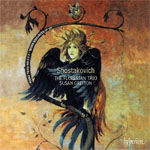 Sadly this is scheduled as the Florestan Trio’s last recording
before they go their separate ways; in this line-up and with
other partners as Domus they have given us some very fine performances.
We weren’t short of performances of one or both of the
Piano Trios – MDT list 36 recordings in all price
ranges and amazon.co.uk have 51 downloads, though some are duplications
There’s even strong competition for this exact coupling,
from the Beaux Arts Trio (Warner 2564625142), but the Florestan
Trio can compete with the best. I can’t remember a performance
of the First Trio that lived up to the sub-title Poème
so well. Sometimes this sounds like a mere makeweight coupled
with the Second Trio, but the quality of the performance
here and the fact that the Blok Romances separate the
two works means that there need be no invidious comparison.
Sadly this is scheduled as the Florestan Trio’s last recording
before they go their separate ways; in this line-up and with
other partners as Domus they have given us some very fine performances.
We weren’t short of performances of one or both of the
Piano Trios – MDT list 36 recordings in all price
ranges and amazon.co.uk have 51 downloads, though some are duplications
There’s even strong competition for this exact coupling,
from the Beaux Arts Trio (Warner 2564625142), but the Florestan
Trio can compete with the best. I can’t remember a performance
of the First Trio that lived up to the sub-title Poème
so well. Sometimes this sounds like a mere makeweight coupled
with the Second Trio, but the quality of the performance
here and the fact that the Blok Romances separate the
two works means that there need be no invidious comparison.
Susan Gritton’s singing is ideal, too – bleak and
powerful without exaggeration – but it’s the Second
Piano Trio that inevitably emerges as the major work here.
From the opening andante, you know instinctively that
this is going to be a first-rate performance, and so it proves.
With Hyperion’s usual quality of recording and a booklet
to match, this is strongly recommended.
If, for any reason, the Blok Romances don’t appeal,
there’s an excellent performance of the two Piano Trios,
coupled with Schnittke, on Nimbus (NI5572 – see 5-star
review):
buy from MusicWeb International at an attractive price, or download
from classicsonline.com
(mp3).
Two other Shostakovich chamber music recordings that have been
favourably reviewed in these Roundups:
- String Quartets 11, 13 and 15: Hyperion – St Petersburg
Quartet (January 2011)
- String Quartets 4 & 7; Piano Quintet: Linn – Brown/Schidlof
Quartet (September 2009)
Discovery of the
Month
Philipp SCHOENDORFF (1565/70-in
or after 1617) Complete Works
Philippe de MONTE (1521-1603)
Usquequo Domine oblivisceris me? 6vv (1587) [5:25]
Philipp SCHOENDORFF Missa
Usquequo Domine 6vv [17:19]
Magnificat sexti toni 5vv (1593) [6:32]
Te decet hymnus 5vv (1600) [2:25]
Philippe de MONTE Magnificat
quarti toni 4vv (1602) [6:32]
Philipp SCHOENDORFF Veni
Sancte Spiritus 5vv (1600) [2:17]
Philippe de MONTE La
dolce vista della donna mia 6vv [2:16]
Philipp SCHOENDORFF Missa
super ‘La dolce vista’ (1594) [17:12]
Cinquecento Renaissance Vokal (Terry Wey, Jakob Huppmann (counter-tenor);
Tore Tom Denys, Thomas Künne (tenor); Tim Scott Whiteley
(baritone); Ulfried Staber (bass))
rec. Kloster Pernegg, Waldviertel, Austria, 21-23 April 2010.
DDD.
Pdf booklet with texts and translations included.
HYPERION CDA67854 [60:02] – from Hyperion-records.co.uk
(mp3 and lossless)
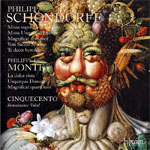 Hands up all those who had even heard of Philipp Schoendorff?
Me neither, but I’m amazed that this particular luminary
has been hidden under a bushel for so long. Perhaps it’s
because so little of his music has survived – even eked
out here with music by Philippe de Monte there’s only an
hour*, but, as performed by Cinquecento and recorded by Hyperion,
his light now shines brightly. Nor is the inclusion of music
by de Monte a mere filler – the motet with which the programme
opens features in Schoendorff’s Mass of the same name and
the parody Mass which ends the recording is also based on the
preceding work by de Monte, under whose direction Schoendorff
worked for Rudolf II at Prague Castle.
Hands up all those who had even heard of Philipp Schoendorff?
Me neither, but I’m amazed that this particular luminary
has been hidden under a bushel for so long. Perhaps it’s
because so little of his music has survived – even eked
out here with music by Philippe de Monte there’s only an
hour*, but, as performed by Cinquecento and recorded by Hyperion,
his light now shines brightly. Nor is the inclusion of music
by de Monte a mere filler – the motet with which the programme
opens features in Schoendorff’s Mass of the same name and
the parody Mass which ends the recording is also based on the
preceding work by de Monte, under whose direction Schoendorff
worked for Rudolf II at Prague Castle.
The (lossless) recording is excellent and the booklet is the
usual high-quality Hyperion production, though I question the
use of a modern translation of Psalm 12 (13) which differs slightly
from the Latin text employed. (The Book of Common Prayer version
would have been a much closer representation of the Latin.)
You’ll either love or hate the Arcimboldo painting of fruit
and veg made into a human face which has been used for the cover.
A splendid addition to the four very fine earlier recordings
which Cinquecento have made for Hyperion:
- de MONTE Missa Ultima
miei sospiri CDA67658 (March 2009 DL Roundup and review)
- REGNART Missa super
Œniades Nymphæ : CDA67640 – see review
- VAET Missa ego
flos campi, etc. CDA67733 (May 2009 DL Roundup and CD review:
Recording of the Month here)
- Music for the Court of Maximilian II: CDA67579 – see
review
Two of these earlier recordings have, inexplicably, languished
briefly in the ‘please buy me’ category: don’t
let that happen to the new recording.
* The booklet says 60:02 but the Hyperion website 59:55.
***
Francisco de PEÑALOSA
(c.1470-1528)
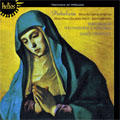 Missa
Ave Maria peregrina 4vv [34:59] Missa
Ave Maria peregrina 4vv [34:59]
Sacris solemniis 4vv [6:14]
Missa Nunca fue pena mayor 4vv [24:47]
The Choir of Westminster Cathedral/James O’Donnell
rec. July 1992, Westminster Cathedral, London
Pdf booklet with texts and translations included
HYPERION HELIOS CDH55326 [66:30] – from hyperion-records.co.uk
(mp3 and lossless)
Scheduled for reissue on CD in July 2011, this is available
to download now – ignore the statement to the contrary.
If your exploration of Spanish polyphony hasn’t yet reached
as far as Peñalosa, this is an ideal opportunity to do
so in style: performances of renaissance choral music from Westminster
Cathedral and Hyperion are practically self-recommending, and
the attractive new price makes this a proposition not to be
ignored.
Thomas TALLIS (c.1505-1585)
Jesu salvator sæculi [4:14]
Gaude gloriosa [17:20]
Sermone blando angelus [5:16]
Magnificat a5 [10:28]
Nunc dimittis a5 [3:15]
Mihi autem nimis [2:28]
Absterge Domine [5:49]
Derelinquat impius [3:55]
Loquebantur variis linguis [3:58]
Suscipe quæso, Domine [9:05]
O nata lux [1:57]
The Cardinall’s Musick/Andrew Carwood
rec. Arundel Castle, 2005. DDD.
Pdf booklet with texts and translations included.
HYPERION CDA67548 [67:45] – from Hyperion-records.co.uk
(CD, mp3 and lossless)
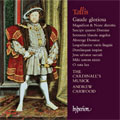 I
was surprised – shocked even – to discover that such
an excellent recording has been selling so poorly as to end
up in Hyperion’s ‘please buy me category’ at
half price. It won’t be there when you read this review,
but I do strongly urge all lovers of renaissance polyphony to
buy it in one form or another. Remember that the mp3 and lossless
recordings both come with the pdf booklet and at only £7.99.
I recommended it in my Tallis
Scholars at 30 survey as an important extra purchase alongside
the Scholars’ recordings of their namesake, but I’m
featuring it here again in order to emphasise its importance. I
was surprised – shocked even – to discover that such
an excellent recording has been selling so poorly as to end
up in Hyperion’s ‘please buy me category’ at
half price. It won’t be there when you read this review,
but I do strongly urge all lovers of renaissance polyphony to
buy it in one form or another. Remember that the mp3 and lossless
recordings both come with the pdf booklet and at only £7.99.
I recommended it in my Tallis
Scholars at 30 survey as an important extra purchase alongside
the Scholars’ recordings of their namesake, but I’m
featuring it here again in order to emphasise its importance.
Where the two are in direct competition, for example in Gaude
gloriosa, I expressed a preference for the Scholars: in
this piece, the slightly slower tempo and the slight insecurity
of the lower voices on Hyperion make me prefer the Gimell recording.
Chapelle du Roi on Volume 3 of their complete series (Signum
SIGCD003, Music for Queen Mary) are also just that little
faster than The Cardinall’s Musick and their performance
comes off very well. Subscribers to the Naxos Music Library
can compare the Signum recording with the Gimell.
There is, however, enough wonderful music on the Hyperion which
is not included in the budget-price 2-CD Gimell set, The Tallis
Scholars sing Thomas Tallis (CDGIM203
) and enough fine singing in most of the programme to repeat
my championing of this as a most valuable extra.
Tomás Luis de VICTORIA
(1548-1611) Missa Vidi speciosam and Motets
Ave Maria a 4 [2:48]
Ave maris stella [6:24]
Ne timeas, Maria [3:23]
Sancta Maria, succurre miseris [4:48]
Vidi speciosam – Quae est ista [7:04]
Missa Vidi speciosam [19:26]
Westminster Cathedral Choir/David Hill – rec. March 1984.
DDD.
Pdf booklet with texts and translations included.
HYPERION CDH55358 [43:53] – from
hyperion-records.co.uk (mp3 and lossless)
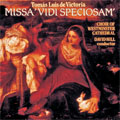 This
recording is in a transitional state: the CD is still listed
as CDA66129 but it’s already available for download at
the reduced price of £4.99 – a pound less than usual
for the Helios label, in reflection of the short-ish contents.
The new booklet is not yet available but there is a usable scanned
copy of the original, with English notes and the texts in English
and Latin, so there’s no need to wait. The music, as usual
from Victoria, challenges even the greatest of his contemporaries,
Palestrina, and the performances do it full justice. There’s
just one roughish patch in the Credo where the trebles
wobble; that should have been retaken, but the rest is as good
as we have come to expect from the collaboration between Hyperion
and Westminster Cathedral. This
recording is in a transitional state: the CD is still listed
as CDA66129 but it’s already available for download at
the reduced price of £4.99 – a pound less than usual
for the Helios label, in reflection of the short-ish contents.
The new booklet is not yet available but there is a usable scanned
copy of the original, with English notes and the texts in English
and Latin, so there’s no need to wait. The music, as usual
from Victoria, challenges even the greatest of his contemporaries,
Palestrina, and the performances do it full justice. There’s
just one roughish patch in the Credo where the trebles
wobble; that should have been retaken, but the rest is as good
as we have come to expect from the collaboration between Hyperion
and Westminster Cathedral.
Victoria’s Missa Dum complerentur is also due to
be reissued on the Helios label in September 2011, but isn’t
yet available at the lower price.
Heinrich SCHÜTZ (1585-1672)
Herr, nun lässest du deinen Diener in Friede fahren,
SWV 432 [4:00]
Ich bin die Auferstehung und das Leben, SWV 464 [3:36]
Herr, nun lässest du deinen Diener in Friede fahren,
SWV 433 [3:18]
Das ist je gewißlich wahr, SWV 277 [4:43]
Musicalische Exequien, SWV279-281 [32:44]
Samuel SCHEIDT (1587-1654) Wir
glauben all an einen Gott* [3:15]
Martin LUTHER (1483-1546) Mit
Fried’ und Freud’ ich fahr’ dahin [3:28]
Vox Luminis (Sara Jäggi, Zsuzsi Tóth, Helen Cassano
and Kerlijne van Nevel (sopranos); Barnabás Hegyi and
Jan Kullmann (counter-tenors); Philippe Froeliger, Satoshi Mizukoshi,
Robert Buckland and Olivier Berten (tenors); Bertrand Delvaux
and Lionel Meunier (basses); Ricardo Rodríguez Miranda
(bass viol); Masato Suzuki (portative organ))/Lionel Meunier
– * Bernard Foucroulle (organ) – rec. 1999.
Pdf booklet with texts and translations available from Naxos
Music Library.
RICERCAR RIC311 [55:08] – from classicsonline.com
(mp3) or stream from Naxos Music Library
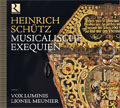 Most
of Schütz’s music is spare, partly as a result of
the reduced forces available after the depredations of the Thirty
Years War, partly, as in the case of the Matthäus-Passion,
because of liturgical restrictions. The music on this recording
manages to be both spare and rich, thanks to the qualities of
Schütz’s writing and to the quality of the performances,
though only a bass viol and chamber organ are used as accompaniment.
The Musicalische Exequien comprises a German funeral
service or ‘concert’ to a set of texts prepared for
his own funeral by Heinrich Reus Posthumus – what a wonderful
name for a compiler of funeral texts – and inscribed on
his own coffin. Most
of Schütz’s music is spare, partly as a result of
the reduced forces available after the depredations of the Thirty
Years War, partly, as in the case of the Matthäus-Passion,
because of liturgical restrictions. The music on this recording
manages to be both spare and rich, thanks to the qualities of
Schütz’s writing and to the quality of the performances,
though only a bass viol and chamber organ are used as accompaniment.
The Musicalische Exequien comprises a German funeral
service or ‘concert’ to a set of texts prepared for
his own funeral by Heinrich Reus Posthumus – what a wonderful
name for a compiler of funeral texts – and inscribed on
his own coffin.
The ‘concert’ itself is short, so all recordings add
various other Schütz works. To the Musical Exequies
Lionel Meunier and his team have added two other beautiful
Schütz settings of the Nunc Dimittis and of other
texts appropriate to a funeral, plus an organ voluntary by Samuel
Scheidt, one of Schütz’s greatest contemporaries,
and a short work by Martin Luther.
The 1987/88 recording by La Chapelle Royale and Philippe Herreweghe
(Harmonia Mundi Gold HMG501261 – download for £3.64
or less from eMusic.com,
but without any texts*) contains a different selection of additional
works – three motets and two pieces from Petits Concerts
Spirituels II – that means that I’m recommending
at least two recordings, though you can have them both for less
than the price of one CD. If I were pressed to make just one
choice, I might still lean towards the greater variety of instrumentation
on Herreweghe’s recording, but only by a small margin.
Some sloppy proof-reading turns fahren into fahen
twice in the German text of Nunc dimittis; otherwise
the Ricercar booklet – available from the Naxos Music Library
but not with the download, a serious omission – is first-rate.
Classicsonline.com also have the Coro recording with The Sixteen
and Harry Christophers, this time coupled with the German
Magnificat, SWV494, the same two German versions of Nunc
Dimittis, SWV432 and 433, as on the Ricercar recording and
two pieces from the Symphoniæ sacræ. (COR16036
– here.)
Having listened via the Naxos Music Library, I can confirm that
this, too, is a strong runner, especially for those admirers
of The Sixteen. In general the tempi are slightly faster than
on Ricercar: the Exequien take 28:11 against 32:44 from
Meunier and 34:52 from Herreweghe. This time the booklet does
come with the download as well as from the Naxos Library, though
the playing time of 50 minutes is short – none of these
recordings is exactly over-filled.
On the basis of owning the original ASV CD from which it’s
licensed, let me also recommend a Musical Concepts super-budget
recording of works by Schütz, including a short extract
from the Exequien (ALC1118, Pro Cantione Antiqua/Edgar
Fleet, £4.99, with notes – download from classicsonline.com).
* £7.99 from classicsonline.com
– still without the booklet, but in 320kb/s quality throughout:
eMusic downloads tend to be at variable bit-rates.
Henry PURCELL (1659-1695)
Nymphs and Shepherds
Manchester Schools Children’s Choir; Hallé Orchestra/Sir
Hamilton Harty – rec.1929 ADD/mono
BEULAH EXTRA 11BX25 [3:19] – from Beulah
(mp3)
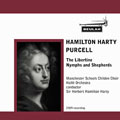 It
sounds rather twee now, but this recording was a frequently
requested favourite on the BBC for over 30 years and there are
still plenty of Mancunians and exiles whose (grand)parents,
(great) aunts and uncles sang in this and the B-side Humperdinck
(below), so it should find a ready market, even in these days
when we demand much better recording and greater authenticity
– the original in Orpheus Britannicus is for solo
soprano and harpsichord, as performed by Nancy Argenta on a
budget-price twofer, Virgin 5618662, but not, surprisingly,
on Hyperion’s Complete Secular Songs of Purcell. It
sounds rather twee now, but this recording was a frequently
requested favourite on the BBC for over 30 years and there are
still plenty of Mancunians and exiles whose (grand)parents,
(great) aunts and uncles sang in this and the B-side Humperdinck
(below), so it should find a ready market, even in these days
when we demand much better recording and greater authenticity
– the original in Orpheus Britannicus is for solo
soprano and harpsichord, as performed by Nancy Argenta on a
budget-price twofer, Virgin 5618662, but not, surprisingly,
on Hyperion’s Complete Secular Songs of Purcell.
François COUPERIN (1668-1733)
Les Concerts Royaux, Nos.1-4
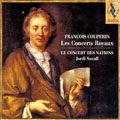 Le
Concert des Nations/Jordi Savall – rec. 2004 (?) DDD. Le
Concert des Nations/Jordi Savall – rec. 2004 (?) DDD.
ALIA VOX AVSA9840 [62:43] – from passionato.com
(mp3)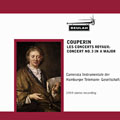
Les Concerts Royaux No.3 in A
Camerata Instrumentale der Hamburger Telemann-Gesellschaft –
rec.1959. ADD/stereo
BEULAH EXTRA 1BX135 [18:12] – from Beulah
(mp3)
Jean-Marie LECLAIR
(1697-1764) Sonata No.VIII in D: Trio avec un violon
ou flute allemande, viole et clavecin
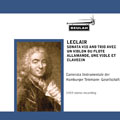 Camerata
Instrumentale der Hamburger Telemann-Gesellschaft – rec.1959.
ADD/stereo Camerata
Instrumentale der Hamburger Telemann-Gesellschaft – rec.1959.
ADD/stereo
BEULAH EXTRA 2BX135 [9:19] – from Beulah
(mp3)
The two Beulah reissues, 1BX135 and 2BX135, are taken from an
award-winning DGG Archiv LP released in 1961 – French music
played better than any French ensemble, according to a contemporary
review. Since then we’ve had many recommendable recordings
of Couperin ‘le Grand’ and Leclair, but these two
reissues, still sounding stylish, are well worth their modest
price, even if you have other recordings. The sound is a little
dry, but not to the extent that it interferes with listening
enjoyment. The Archiv LP also contained two works by Boismortier
– perhaps we may have those, too, in due course.
If you purchase the Beulah Couperin for just £1.25, you
may well wish to investigate the other Concerts royaux,
in which case you can’t do better than Jordi Savall from
passionato.com. There’s surprisingly little difference
in the chosen tempi on the two recordings. Passionato also have
the Trio Sonnerie performances of the complete Concerts
on ASV, in mp3 and lossless versions, but most will prefer the
rather faster tempi which Jordi Savall sets and his more colourful
instrumental line-up. His version is less expensive (£5.99)
than the ASV, though in mp3 only, without the lossless option
– a shame in view of the fact that the hard disc equivalent
is a hybrid SACD.
The Leclair, billed as ‘Sonata No.VIII’ on the Archiv
LP and the Beulah website, but (wrongly) given as ‘Sonata
No.7’ on the track information, is a Trio Sonata for violin
or flute, viol and keyboard. It is Op.2/7 and, as with the Couperin,
the performance still sounds stylish even by comparison with
the modern recording of the complete chamber music with flute,
played by Fenwick Smith et al, on Naxos 8.557440/1. Once again
purchase of the Beulah will probably lead you to the classicsonline.com
download of the Naxos set – here
– or at least to hearing the set from the Naxos Music Library.
Antonio VIVALDI (1678-1741)
Concerto in e minor for bassoon, strings and continuo, RV484
Marco Constantini (bassoon); I Musici/Maria Teresa Garatti (harpsichord)
– rec.1960. ADD/stereo
BEULAH EXTRA 2BX147 [11:44] – from Beulah
(mp3)
Concerto in G for two mandolins, strings and organ continuo,
RV532
Gino del Vescovo, Tommaso Ruta (mandolins); I Musici/ Maria
Teresa Garatti (organ) – rec.1960. ADD/stereo
BEULAH EXTRA 3BX147 [12:14] – from Beulah
(mp3)
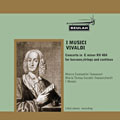 Circa
1962, I used to think I Musici’s Vivaldi and the music
of his Italian contemporaries the last word in authenticity
– smaller-scale and rhythmically more enticing than the
likes of Karl Münchinger and the Stuttgart Chamber Orchestra.
Now their style seems almost as dated as Münchinger’s,
with steady, rather sedate fast movements. It’s not so
much a matter of timing – the Naïve recording of RV484
(OP30496) is only seconds shorter. Nevertheless, I enjoyed re-hearing
I Musici in these two concertos, especially in RV532 where the
playing is as lively as one could wish. Those who think modern
period-instrument performances too fast and lacking in emotional
engagement will enjoy them even more, especially as the recordings
sound so well in these transfers. Circa
1962, I used to think I Musici’s Vivaldi and the music
of his Italian contemporaries the last word in authenticity
– smaller-scale and rhythmically more enticing than the
likes of Karl Münchinger and the Stuttgart Chamber Orchestra.
Now their style seems almost as dated as Münchinger’s,
with steady, rather sedate fast movements. It’s not so
much a matter of timing – the Naïve recording of RV484
(OP30496) is only seconds shorter. Nevertheless, I enjoyed re-hearing
I Musici in these two concertos, especially in RV532 where the
playing is as lively as one could wish. Those who think modern
period-instrument performances too fast and lacking in emotional
engagement will enjoy them even more, especially as the recordings
sound so well in these transfers.
The Four Seasons, Op.8/1-4
Julian Olevsky (violin); Vienna State Opera Orchestra/Hermann
Scherchen – rec.1959. ADD/stereo.
BEULAH EXTRA 1-4BX148 [45:19] – from Beulah
(mp3)
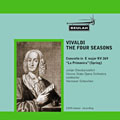 I
approached this recording extremely doubtful that we needed
a reissued version of the Four Seasons of this vintage.
The fact that this recording first appeared in the UK on the
budget Music for Pleasure label in 1968 suggests that it wasn’t
too highly regarded even in the 1960s. Certainly Spring opens
very quietly and rather heavily from the orchestra, but there’s
some light and impressive fiddling from Olevsky and there’s
a real feeling of variety – if anything, the contrast between
louder and softer sections is too marked. I
approached this recording extremely doubtful that we needed
a reissued version of the Four Seasons of this vintage.
The fact that this recording first appeared in the UK on the
budget Music for Pleasure label in 1968 suggests that it wasn’t
too highly regarded even in the 1960s. Certainly Spring opens
very quietly and rather heavily from the orchestra, but there’s
some light and impressive fiddling from Olevsky and there’s
a real feeling of variety – if anything, the contrast between
louder and softer sections is too marked.
The slow movement observes the indication in the score for the
viola, imitating the goatherd’s dog, to play louder than
the rest, an indication which not everyone observes. (Si
deve suonare sempre molto forte, e strappato). The overall
tempo for this movement is much slower than is now the norm,
but not to the extent that I found objectionable – after
all, the goatherd is asleep. I did, however, feel like getting
out to push the tempo along in the Spring finale and several
times in the later concertos. The hunters in the Autumn concerto
are never going to catch their prey at this pace. The Beulah
transfer of the recording – originally made by Westminster
(?) – still sounds well.
By 1968 the Vox Turnabout recording made by Susanne Lautenbacher
and the Württemberg Chamber Orchestra under Jörg Faerber
had stolen the budget-price market, a version which I owned
for many years and would really like to see reissued in the
UK – I believe that it’s available from Vox in the
US. The best modern-instrument CD or download comes from Alan
Loveday and the ASMF with Neville Marriner (Decca Originals
475 7531: Download of the Month – see September 2009 Download
Roundup).
Leonardo LEO (1694-1744) Concerto
in D for cello, strings and continuo
Enzo Altobelli (cello); I Musici/Maria Teresa Garatti (harpsichord)
– rec.1960. ADD/stereo
BEULAH EXTRA 1BX147 [17:06] – from Beulah
(mp3)
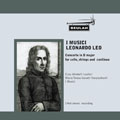 Like
the Vivaldi (above) this is taken from an early-1960s recording,
SABL199, with music by Durante and Pergolesi, which I remember
borrowing from the University Music Library. Leonardo Leo was
not exactly a household name then, nor is he now, so I Musici’s
championing of his music was and remains praiseworthy. I may
not think I Musici the last word in baroque performance, as
I did then, but this recording remains enjoyable – a little
dogged in places, especially in the finale, but the playing
is mainly sprightly, certainly by comparison with the almost
contemporary Olevsky-Scherchen Vivaldi Seasons (above)
and the recording has transferred very well. Like
the Vivaldi (above) this is taken from an early-1960s recording,
SABL199, with music by Durante and Pergolesi, which I remember
borrowing from the University Music Library. Leonardo Leo was
not exactly a household name then, nor is he now, so I Musici’s
championing of his music was and remains praiseworthy. I may
not think I Musici the last word in baroque performance, as
I did then, but this recording remains enjoyable – a little
dogged in places, especially in the finale, but the playing
is mainly sprightly, certainly by comparison with the almost
contemporary Olevsky-Scherchen Vivaldi Seasons (above)
and the recording has transferred very well.
If you wish to explore Leo’s Cello Concertos further,
all six are offered on a 2-CD set at super-budget price from
Brilliant Classics, 93681, around £8.50 in the UK. (See
the review of the larger box set from which these six concertos
are taken – here.)
Joseph HAYDN (1732-1809)
Symphony No.53 in D [24:08]
– with alternative finale (Sinfonia in D, Hob. Ia.7) [4:00]
Symphony No.54 in G [31:02]
Heidelberg Symphony Orchestra/Thomas Fey – rec.? (P) and
(C) 2011. DDD.
Pdf booklet included.
HÄNSSLER 98.626 [62:10] – from classicsonline.com
(mp3) or stream from Naxos Music Library.
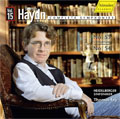 This
is the Volume Fifteen of the series, so by now its virtues are
generally known. The music of Haydn’s middle period is
free from the Sturm und Drang drama of the preceding
works but still very enjoyable when it’s as well played
as here – stylish modern-instrument performances that take
account of period practice even more than the ground-breaking
Decca series with Antal Dorati or Colin Davis’s splendid
set of the London Symphonies. The recording sounds well in good
mp3. This
is the Volume Fifteen of the series, so by now its virtues are
generally known. The music of Haydn’s middle period is
free from the Sturm und Drang drama of the preceding
works but still very enjoyable when it’s as well played
as here – stylish modern-instrument performances that take
account of period practice even more than the ground-breaking
Decca series with Antal Dorati or Colin Davis’s splendid
set of the London Symphonies. The recording sounds well in good
mp3.
I recommended a number of Haydn downloads in 2009, including
some earlier volumes from this Hänssler series, but so
far haven’t included these two symphonies among my recommendations:
consider them recommended.
André GRÉTRY (1741-1813)
Céphale et Procris: ballet (arr. Mottl)
Le grand Orchestre symphonique de l’INR Belge, Bruxelles/Franz
André – rec.1952. ADD/mono
BEULAH EXTRA 1BX138 [9:18] – from Beulah
(mp3)
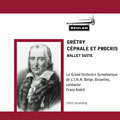 Grétry’s
music is Beecham lollipop territory: his Suite from Zémire
et Azore has just been reissued. (Beecham conducts French
Music, EMI 9099322, 6 CDs at super-budget price – see
review).
The Céphale et Procis ballet is equally enjoyable,
though just lacking the Beecham magic. The recording is rather
muffled – it sounds older than 1952, more like a 78 rpm
recording of the 1940s – but acceptable and free from surface
noise. Even in 1952 I note that a reviewer felt that the recording
needed a treble boost, and I think the transfer would have benefited
from a slight lift. André’s orchestra are no baroque
specialists, though their playing is mostly lively enough, so
the performance of Mottl’s arrangement sounds more like
the kind of realisation that Walton or Respighi made of music
of the period, which isn’t necessarily a bad thing, as
I enjoy Walton’s Wise Virgins ballet and the like.
(See the November 2008 Roundup for the Chandos recording of
the Walton). Grétry’s
music is Beecham lollipop territory: his Suite from Zémire
et Azore has just been reissued. (Beecham conducts French
Music, EMI 9099322, 6 CDs at super-budget price – see
review).
The Céphale et Procis ballet is equally enjoyable,
though just lacking the Beecham magic. The recording is rather
muffled – it sounds older than 1952, more like a 78 rpm
recording of the 1940s – but acceptable and free from surface
noise. Even in 1952 I note that a reviewer felt that the recording
needed a treble boost, and I think the transfer would have benefited
from a slight lift. André’s orchestra are no baroque
specialists, though their playing is mostly lively enough, so
the performance of Mottl’s arrangement sounds more like
the kind of realisation that Walton or Respighi made of music
of the period, which isn’t necessarily a bad thing, as
I enjoy Walton’s Wise Virgins ballet and the like.
(See the November 2008 Roundup for the Chandos recording of
the Walton).
Fryderyk CHOPIN (1810-1849)
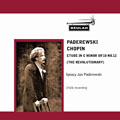 Étude
in c minor, Op.10/12* [2:39] Étude
in c minor, Op.10/12* [2:39]
Prelude in A-flat, Op.28/17** [4:02]
Waltz in c-sharp minor, Op.64/2*** [3:25]
Étude in G-flat, Op.25/7^ [4:25]
Étude in c minor, Op.10/5^^ [2:07]
Ignacy Jan Paderewski (piano) – rec.1917***, 1923^ and
1928. ADD/mono
BEULAH EXTRA 1BX136*, 2BX136**, 2BX136***, 4BX136^, 5BX136^^
[16:39] – from Beulah
(mp3)
Franz LISZT (1811-1886)
Étude de Concert in f minor
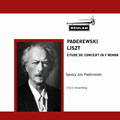 Ignacy
Jan Paderewski (piano) – rec.1923. ADD/mono Ignacy
Jan Paderewski (piano) – rec.1923. ADD/mono
BEULAH EXTRA 6BX136 [4:49] – from Beulah
(mp3)
Ignacy Paderewski’s Chopin and Liszt is holy ground on
which I almost fear to tread: like Albert Schweitzer, he was
so famous for his extra-musical activities that his playing
is almost beyond criticism. His very name became so synonymous
with pianistic virtuosity that it was often used as a nickname,
as in the long-running comedy programme It Ain’t Half
Hot, Mum, where it was applied (mispronounced) to the Cambridge-graduate
pianist Gunner Graham.
I started with the 1923 Liszt recording, made when he was widely
regarded as the greatest living pianist, even though he had
only recently returned from his political to his musical career.
The first surprise was how good the recording sounded, considering
its age, the second that the style of playing didn’t sound
completely alien, with sparing use of right-hand-before-left.
There is some asynchronous playing – that used to be the
style, though it was already becoming old-fashioned – but
it’s perfectly tolerable. I didn’t find it enlightening,
as I did the Chopin, however.
In Chopin, too, the sound is more than tolerable, though the
1917 G-flat Étude is less than ideal, and the
playing still holds up well. These are important historical
documents, but they’re much more, too, especially hearing
Chopin from a Polish pianist only a couple of generations removed
from the composer.
Anton BRUCKNER (1824-1896)
Overture in g minor
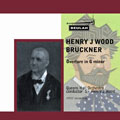 Queen’s
Hall Orchestra/Sir Henry Wood – rec.1937. ADD/mono Queen’s
Hall Orchestra/Sir Henry Wood – rec.1937. ADD/mono
BEULAH EXTRA 9BX3 [8:48] – from Beulah
(mp3)
Now that Bruckner’s Symphonies and Masses are firmly established
repertoire, this attractive but untypical Overture isn’t
often performed: I believe the only current rival is offered
as a filler to Lovro von Matacic’s recording of the ‘Romantic’
Symphony on Testament SBT1050. Sir Henry Wood gives a jaunty
performance and few allowances have to be made for the recording.
Symphony No.9 in d minor (ed. Robert Haas)
Columbia Symphony Orchestra/Bruno Walter – rec.1960. ADD/stereo
BEULAH EXTRA 1-3BX145 [58:24] – from Beulah
(mp3)
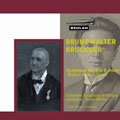 It
was from Walter’s and Klemperer’s Bruckner and Mahler
– a mixture of the two in my case – that most of those
of my age came to know those composers. Bruckner’s Ninth
was the exception for me, with Jochum on an inexpensive DGG
Heliodor early stereo recording providing the gateway, and I
had never actually caught up with this classic performance until
now. It
was from Walter’s and Klemperer’s Bruckner and Mahler
– a mixture of the two in my case – that most of those
of my age came to know those composers. Bruckner’s Ninth
was the exception for me, with Jochum on an inexpensive DGG
Heliodor early stereo recording providing the gateway, and I
had never actually caught up with this classic performance until
now.
As recently as 2008 the Sony reissue of this ‘Indian Summer’
recording was being used as the benchmark against which new
recordings of the Ninth were judged and often found wanting.
Walter was less inclined to tempo shifts than Jochum and, though
I maintain a great liking for the latter, with his Bruckner
CDs still forming the backbone of my collection*, there’s
plenty of room for Walter’s steadier hand, too.
The recording was good for its time and, despite some haziness
at the very beginning, still sounds well enough for this to
be the prime recommendation for many listeners. There’s
an earlier (1952) Walter recording of the Ninth on Archipel
and Walter’s Bruckner Fourth remains available from
Sony, but the Sony CD of the Ninth seems to have been
deleted, so this Beulah download and one from Amazon.co.uk are
the only shows currently in town, with the Beulah working out
less expensive at £4.00 for the three tracks than the
Amazon at £7.49.
* Currently available only as a complete 9-CD set at budget
price, DG 469 8102. Download the 2-CD DG Originals coupling
of Symphonies 8 and 9 from passionato.com (449
7582).
Louis Moreau GOTTSCHALK (1829-1869)
Piano Music Vol. 5
Sospiro ‘Valse poétique’ RO241 Op. 24
[2:54]
Marguerite ‘Grande valse brillante, valse sentimentale’
RO158 Op. 76 [4:16]
Bataille ‘Étude de concert’ RO25 Op.
63 [8:27]
Réponds-moi ‘Danse cubaine, caprice brillant’
RO225 Op. 50 [3:17]
Solitude RO239 Op. 65 [4:28]
8ème ballade RO16 Op. 90 [10:34]
Tremolo ‘Grande étude de concert’ RO265
Op. 58 [6:05]
Orfa ‘Grande polka’ RO186 Op. 71 [2:57]
El cocoyé ‘Grand caprice cubain de bravura’
RO57 Op. 80 [7:00]
Polka de salon RO207 Op. 1 [3:30]
Rayons d’azur ‘Polka de salon’ RO220 Op.
77 [3:35]
La chasse du jeune Henri RO53 Op. 10 [9:35]
rec. January 2001, All Saints, Durham Road, East Finchley, London,
UK. DDD.
HYPERION CDA67248 [66:00] – from hyperion-records.co.uk
(mp3 and lossless)
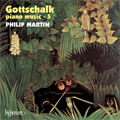 Musical
mavericks don’t come more intriguing than this; born in
New Orleans to a Jewish father and a Creole mother, Louis Moreau
Gottschalk was rejected by the Paris Conservatoire and returned
to the US before embarking on a concert career in South America.
Like Liszt he wrote and performed his own pieces, gaining a
reputation as something of a keyboard wizard. Happily, Hyperion
engaged Irish-born pianist Philip Martin to record Gottschalk’s
œuvre for piano, in a series that spans eight volumes;
I came across this fifth instalment on CD a few years ago, and
was so astounded by both the music and the music-making that
I went out and bought the remaining discs. Musical
mavericks don’t come more intriguing than this; born in
New Orleans to a Jewish father and a Creole mother, Louis Moreau
Gottschalk was rejected by the Paris Conservatoire and returned
to the US before embarking on a concert career in South America.
Like Liszt he wrote and performed his own pieces, gaining a
reputation as something of a keyboard wizard. Happily, Hyperion
engaged Irish-born pianist Philip Martin to record Gottschalk’s
œuvre for piano, in a series that spans eight volumes;
I came across this fifth instalment on CD a few years ago, and
was so astounded by both the music and the music-making that
I went out and bought the remaining discs.
On the main MusicWeb International site I’ve reviewed a
number of Hyperion’s piano recordings and have always been
most impressed by the unforced naturalness of their ‘house
sound’; few labels are as consistently satisfying in this
respect, and I’m pleased to report this Gottschalk cycle
is no exception.
For those new to this composer, his music can best be described
as virtuosic yet refreshingly refined and original. And it’s
these qualities that make Martin’s performances so compelling;
there’s inner detail, subtle shading and rhythmic sophistication,
all presented in a warm, clear acoustic. Just listen to the
start of Sospiro; it’s almost as if one’s eavesdropped
on a musical doodle, which soon morphs into a delightfully sprung
little waltz. Martin’s fluent playing is simply astonishing,
the intimate scale of this music supremely well judged.
And it just gets better; the winsome waltz Marguerite
is buoyed by a gentle bass line, and one has to marvel at how
Martin makes the first part of Bataille sing so. A concert
étude it may be, but there’s introspection
here too, only modulating into something more flamboyant later.
Whatever the mood or manner, Martin seems to respond intuitively
to Gottschalk’s demands; just listen to how he articulates
the slinky Cuban rhythms of Réponds-moi for instance,
or the swirling thistle that is Solitude. This is simply
gorgeous, a blend of spontaneity and charm that’s a joy
to hear.
After the wandering, rather Schumannesque 8ème ballade
comes Tremolo, Gottschalk’s pièce
de resistance. This is one of those pianistic miracles that
will either leave you gasping or laughing out loud – perhaps
even a bit of both. The title is self-explanatory, but suffice
to say that Martin makes short work of this challenging piece.
If you download just one track from this album – heretical
as that may seem – then let this be the one. It’s
jaw-dropping, I assure you, and will have you reaching for the
repeat button.
How do you follow that? Well, the ‘grand polka’
Orfa certainly makes a strong impression; there’s
a blend of elegance and brio here, the recording faithfully
picking up the discreet bass underpinnings and sparkling treble.
Even in the stormy chords of El cocoyé there’s
no trace of congestion or hint of strain; piano sound doesn’t
come better than this, Gottschalk’s jewel-like figures
very well captured by the Hyperion team. I know this piece intimately,
and yet it always sounds fresh and spontaneous, with none of
the artifice or expressive overload one might expect from such
a showpiece.
Rayons d’azur is another of Gottschalk’s perky
little polkas, restrained and florid by turns but always beautifully
shaped and shaded. Indeed, it’s hard to imagine these pieces
being more sympathetically played – or recorded –
La chasse du jeune Henri a consummation of all that’s
gone before. Articulation, dynamics and rhythms are beyond reproach,
making this the perfect sign-off for an altogether enchanting
recital.
This is my first Hyperion download – I chose the ‘CD-quality’
flacs rather than the mp3s – and once I’d installed
their DL Manager the process was simplicity itself. Including
the pdf booklet as part of the download is a nice touch, and
one that others would do well to emulate. A must-hear for all
pianophiles and those who appreciate top-notch recordings.
Dan Morgan
[As Dan had reviewed the lossless version, I decided to try
the mp3 equivalent and can report that the sound is more than
satisfactory in that format, too, even though Hyperion employ
a variable bit-rate rather than a rigid 320kb/s for their mp3s
– their belief is that 320k is not always necessary. As
for the music and performances, they are all that Dan says.
I think you’ll want to try some of the other Hyperion volumes,
too, or go for the 2-CD Vox recording made by Eugene List with
the Vienna State Opera Orchestra and Berlin Symphony under Igor
Buketoff and Samuel Adler – download from classicsonline.com
(CDX-5009, mp3 only, for £9.99, complete with booklet).
The CD equivalents of these performances are at the front of
a cabinet where I can get at them easily: La Nuit des Tropiques
(A Night in the Tropics, CD2) is a regular favourite. Try
it first, if you can, from the Naxos Music Library, where you’ll
also find rival Eugene List recordings of Gottschalk from Vanguard.
BW.]
Johannes BRAHMS (1833-1897)
Hungarian Dances, Nos.1-3, 5-7 and 10.
Hamburg Radio Symphony Orchestra/Hans Schmidt-Isserstedt –
rec.1953. ADD/mono
BEULAH EXTRA 1-7BX144 [19:00] – from Beulah
(mp3)
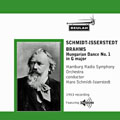 Lively
performances of this music, with a zigeuner lilt –
performers from Brahms’s native Hamburg, yet playing like
true Hungarians. The recording, first issued on a 10" LP,
is a trifle muddy in the bass and shrill on top, but not so
that it would spoil your enjoyment. Indeed, judging by the 1954
review comments, Beulah have managed to tame some of the shrillness
and there’s no significant surface noise. If you are looking
for all the Hungarian Dances at budget price, you can’t
do better than the Budapest Symphony Orchestra under István
Bogár on Naxos 8.550110 – from classicsonline.com
– one of their earliest CDs which I bought in the days
when only Woolworths sold Naxos, and still one of the best. Lively
performances of this music, with a zigeuner lilt –
performers from Brahms’s native Hamburg, yet playing like
true Hungarians. The recording, first issued on a 10" LP,
is a trifle muddy in the bass and shrill on top, but not so
that it would spoil your enjoyment. Indeed, judging by the 1954
review comments, Beulah have managed to tame some of the shrillness
and there’s no significant surface noise. If you are looking
for all the Hungarian Dances at budget price, you can’t
do better than the Budapest Symphony Orchestra under István
Bogár on Naxos 8.550110 – from classicsonline.com
– one of their earliest CDs which I bought in the days
when only Woolworths sold Naxos, and still one of the best.
Pyotr Ilyich TCHAIKOVSKY (1840-1893)
Symphony No.2 in c minor, Op.17 (‘Little Russian’)
Cincinatti Symphony Orchestra/Sir Eugene Goossens – rec.1941.
ADD/mono
World premiere recording.
BEULAH EXTRA 1-4BX149 [30:07] – from Beulah
(mp3)
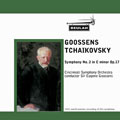 Tchaikovsky’s
Second Symphony earned its nickname ‘Little Russian’
because of its use of Ukrainian folk tunes. Though it’s
still the least-known of the cycle, it seems incredible that
such a tuneful and attractive work had to wait until 1941 for
its first recording, from RCA Victor. Beulah, who have already
given us this performance on CD (1PD11, with the Fifth Symphony,
available as a download from iTunes),
now follow up with this recommendable separate download. The
sound is surprisingly good for its age and the lively performance
was certainly worth preserving. Tchaikovsky’s
Second Symphony earned its nickname ‘Little Russian’
because of its use of Ukrainian folk tunes. Though it’s
still the least-known of the cycle, it seems incredible that
such a tuneful and attractive work had to wait until 1941 for
its first recording, from RCA Victor. Beulah, who have already
given us this performance on CD (1PD11, with the Fifth Symphony,
available as a download from iTunes),
now follow up with this recommendable separate download. The
sound is surprisingly good for its age and the lively performance
was certainly worth preserving.
Symphony No.6 in b minor, Op.74 (Pathétique)
Paris Conservatoire Orchestra/Charles Munch – rec.1948.
ADD/mono
BEULAH EXTRA 6-9BX32 [46:16] – from Beulah
(mp3)
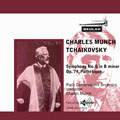 Munch
re-recorded the Pathétique at least once, in 1962
with the Boston Symphony Orchestra (SB6550), a version which
did not meet with much critical acclaim – indeed when it
was reissued on CD, there were unfavourable comparisons with
‘the Munch of old’. Here is that ‘Munch of old’
in a convincing performance of the symphony, nothing to mark
down on my critical slate, but nothing that throws any fresh
light on the work either. The 1948 recording was still deemed
good enough to be issued on LP in 1951. It won’t spoil
your enjoyment of the performance, though it sounds more restricted
than I had expected for its date. As usual, Beulah have delivered
a transfer free of extraneous noises. Munch
re-recorded the Pathétique at least once, in 1962
with the Boston Symphony Orchestra (SB6550), a version which
did not meet with much critical acclaim – indeed when it
was reissued on CD, there were unfavourable comparisons with
‘the Munch of old’. Here is that ‘Munch of old’
in a convincing performance of the symphony, nothing to mark
down on my critical slate, but nothing that throws any fresh
light on the work either. The 1948 recording was still deemed
good enough to be issued on LP in 1951. It won’t spoil
your enjoyment of the performance, though it sounds more restricted
than I had expected for its date. As usual, Beulah have delivered
a transfer free of extraneous noises.
Johan SVENDSEN (1840-1911)
Carnival in Paris, Episode, Op.9
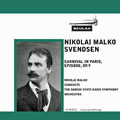 Danish
State Radio Symphony Orchestra/Nikolai Malko – rec.1950.
ADD/mono Danish
State Radio Symphony Orchestra/Nikolai Malko – rec.1950.
ADD/mono
BEULAH EXTRA 1BX131 [10:29] – from Beulah
(mp3)
The recording shows its age more than the Elgar Cello Concerto
(below). Its roughness was commented on in reviewing a rival
recording as long ago as 1954, but that doesn’t spoil the
enjoyment of this lively performance of a lightweight piece.
André MESSAGER (1853-1929)
Les deux Pigeons: Suite
Orchestra of the Opéra Comique, Paris/Richard Blareau
– rec.1952. ADD/mono
BEULAH EXTRA 1BX139 [] – from Beulah
(mp3)
Unfortunately I didn’t notice until I was about to finalise
this roundup that my review disc didn’t contain this recording.
I hope to be able to put matters right in the June/2 Roundup.
Three recordings which were contained on the June 2011 disc
have already been reviewed in my May/1 Roundup: Elgar Falstaff
(Boult 25BX12), Beethoven Symphony No.3 (Boult 26-29BX12)
and Rossini La Gazza Ladra Overture (Beinum 7BX37)
Engelbert HUMPERDINCK (1854-1921)
Hänsel und Gretel: Overture
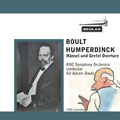 BBC
Symphony Orchestra/Sir Adrian Boult – rec.1932. ADD/mono BBC
Symphony Orchestra/Sir Adrian Boult – rec.1932. ADD/mono
BEULAH EXTRA 31BX12 [7:24] – from Beulah
(mp3)
This sounds well for its age and the performance is as reliable
as almost any Boult recording of any vintage is bound to be.
Now that concerts so rarely begin with an overture and symphonies
which used to have an overture coupling on LP now run to two
symphonies, there’s certainly a place for this reissue.
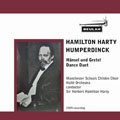 Hänsel
und Gretel: Dance Duet Hänsel
und Gretel: Dance Duet
Manchester Schools Children’s Choir; Hallé Orchestra/Sir
Hamilton Harty – rec.1929 ADD/mono
BEULAH EXTRA 10BX25 [3:14] – from Beulah
(mp3)
This is the flip side of the famous Purcell recording (above).
It’s equally twee or charming, depending on your point
of view and, perhaps, if you have or had a distant relative
who sang then. Like the Purcell, the sound is amazingly clear
for its age.
Leoš JANÁČEK
(1854-1928)
The Eternal Gospel, Legend for soprano, tenor, chorus and orchestra
(1913)* [18.45]
The Ballad of Blaník (1919) [8.02]
The Fiddler’s Child, Ballad for solo violin and orchestra
(1913)** [11.46]
The Excursions of Mr Brouček, Suite for orchestra (1908-17)
[20.58]
Gwyneth-Ann Jeffers (soprano: Angel), Adrian Thompson (tenor:
Joachim of Fiore), Edinburgh Festival Chorus*; Elizabeth Layton
(violin)**
BBC Scottish Symphony Orchestra/Ilan Volkov – rec. June
2004 and January 2005. DDD
HYPERION CDA67517 [59.54] – from hyperion-records.co.uk
(mp3 or lossless)
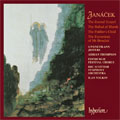 Of
this 2005 Recording of the Month, Evan Dickerson wrote: ‘There
are several reasons to give this disc an unqualified welcome.
All Janáček fans should be acquiring it without
delay, and those as yet unconverted should seriously consider
it. Sixty minutes may be slightly short measure for some but
it is quality all the way.’ (see review).
To which I would only add that the reduced price for the download
(£6.99 instead of the usual £7.99) takes account
of the short-ish length. Of
this 2005 Recording of the Month, Evan Dickerson wrote: ‘There
are several reasons to give this disc an unqualified welcome.
All Janáček fans should be acquiring it without
delay, and those as yet unconverted should seriously consider
it. Sixty minutes may be slightly short measure for some but
it is quality all the way.’ (see review).
To which I would only add that the reduced price for the download
(£6.99 instead of the usual £7.99) takes account
of the short-ish length.
Despite all that, it’s found its way onto Hyperion’s
half-price ‘please buy me list’. Do, please, buy it
in one form or another. Even though the £5.60 offer for
the CD will have ended by the time that you read this, the download
is almost as good a bargain.
Johannes BRAHMS (1833-1897)
Symphony No.1 in c minor op.68 [44:06]
Edward ELGAR (1857-1934)
Variations on an Original Theme Op.36, ‘Enigma’* [30:26]
John Douglas Todd interviews Sir Adrian Boult (extract from
85th birthday broadcast) [3.32]
George Thalben Ball organ*
BBC Symphony Orchestra/Sir Adrian Boult
rec. Royal Albert Hall, London, 29 March 1971 (Elgar); 17 August
1976 (Brahms); BBC Studios, 25 March 1974 (interview). Stereo
ADD.
Pdf booklet included in download
ICA CLASSICS ICAC1509 [78:21] – from classicsonline.com
(mp3) or stream from Naxos Music Library.
Sir Edward ELGAR Variations
on an Original Theme Op.36, ‘Enigma’
BBC Symphony Orchestra/Sir Adrian Boult – rec.1936. ADD/mono
BEULAH EXTRA 30BX12 [26:10] – from Beulah
(mp3)
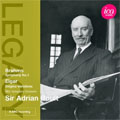 Of
the three great Bs who introduced me to much of the classical
music repertoire, Beecham, Boult and Barbirolli, I’m beginning
to realise how important Boult was in the pantheon. These rather
topless BBC recordings from the 1970s may not present him in
the best sonic light – perhaps that’s why we haven’t
had them released on the BBC Classics label – but the performances
were well worth preserving. Of
the three great Bs who introduced me to much of the classical
music repertoire, Beecham, Boult and Barbirolli, I’m beginning
to realise how important Boult was in the pantheon. These rather
topless BBC recordings from the 1970s may not present him in
the best sonic light – perhaps that’s why we haven’t
had them released on the BBC Classics label – but the performances
were well worth preserving.
In typical Boult fashion, his Brahms steers a middle course,
which sounds unadventurous or even boring in print, yet is anything
but in practice. The ‘big’ tune in the finale is just
right – with enough emotional weight, but never allowed
to linger too long – and by this stage the recording seems
to have brightened somewhat, though it’s never ideal. The
roar of approval at the end is more than justified. Aficionados
of Boult’s Brahms may also wish to note that classicsonline.com
have a number of his 1950s recordings for £1.99, including
the First Symphony and Tragic Overture on 9.80228
– not available in the USA.
The Enigma post-dates Boult’s fourth (?) and last
studio recording of 1970 (now EMI Masters 6317832, with Holst
Planets – see review)
and makes a fascinating comparison with the Beulah reissue of
his 1936 version. Some reviewers found problems with both his
1960s World Record Club (later Classics for Pleasure) and 1970
versions, but few, I think, will fail to yield to this ICA recording.
Even the sound is better here than in the Brahms, though it
dates from earlier. The overall tempo had slowed over the years
but Boult remained a firm hand in Elgar, even in the versions
of the symphonies which he recorded in the 1970s for Lyrita
(SRCD221) – not his best, I think, but that’s a personal
and comparative view based on what he really could and did achieve.
For an alternative, more favourable view of those symphony recordings,
see review
and review.
Though the applause for the Elgar is less thunderous, I thoroughly
enjoyed both performances. The programme is rounded off with
a short extract from an 85th-birthday interview from 1974 on
the revealing subject of tempo, including the interesting observation
that the opening of a movement is often misleading in setting
the tempo.
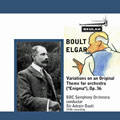 The
1936 recording sounds amazingly well in the Beulah transfer
– where the ICA 1971 recording is a bit tubby, the Beulah
of 35 years earlier sounds thinner and lighter, with the merest
hint of surface noise. Though Boult took four minutes less than
in 1970 or 1971, there’s never any suggestion of haste
about his 1936 version, nor did I ever think that the tempi
had been unduly dictated by 78 rpm side lengths. A classic very
effectively restored at a very reasonable price. The
1936 recording sounds amazingly well in the Beulah transfer
– where the ICA 1971 recording is a bit tubby, the Beulah
of 35 years earlier sounds thinner and lighter, with the merest
hint of surface noise. Though Boult took four minutes less than
in 1970 or 1971, there’s never any suggestion of haste
about his 1936 version, nor did I ever think that the tempi
had been unduly dictated by 78 rpm side lengths. A classic very
effectively restored at a very reasonable price.
The CHARM project offers the same BBCSO/Boult 78s Enigma
free – here
– but in a noticeably thinner (though acceptable) transfer
with a degree of surface noise and slight distortion -you also
have the nuisance of the gaps at the ends of five of the six
78 sides. Try it there and, if you enjoy it, as I think you
will, buy the Beulah.
Sir Edward ELGAR Cello Concerto
in e minor, Op.85
Anthony Pini (cello); London Philharmonic Orchestra/Eduard van
Beinum – rec.1949? ADD/mono
BEULAH EXTRA 8-9BX37 [26:38] – from Beulah
(mp3)
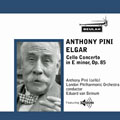 This
was my first recording of the Cello Concerto, coupled
with Cockaigne and Wand of Youth on ACL181, having
first appeared on 10" Decca LW3023 in 1950. The chief competition
came from Tortelier and Sargent on a 10" EMI recording,
a more intense performance that was itself soon to be superseded
by the Du Pré-Barbirolli partnership. I’m not sure
if it’s because this Pini/Beinum recording was my introduction
to the work, but I’ve come to feel over the years that
the classic Du Pré recording milks the emotion too much,
and I’m happy to return to this more straightforward reading,
especially now that the sound is immeasurably improved on that
Ace of Clubs release. If you thought that the Elgar Cello
Concerto was too intense for your liking, this may be just
the corrective that you were looking for. This
was my first recording of the Cello Concerto, coupled
with Cockaigne and Wand of Youth on ACL181, having
first appeared on 10" Decca LW3023 in 1950. The chief competition
came from Tortelier and Sargent on a 10" EMI recording,
a more intense performance that was itself soon to be superseded
by the Du Pré-Barbirolli partnership. I’m not sure
if it’s because this Pini/Beinum recording was my introduction
to the work, but I’ve come to feel over the years that
the classic Du Pré recording milks the emotion too much,
and I’m happy to return to this more straightforward reading,
especially now that the sound is immeasurably improved on that
Ace of Clubs release. If you thought that the Elgar Cello
Concerto was too intense for your liking, this may be just
the corrective that you were looking for.
Charles Villiers STANFORD (1852-1924)
Fantasia and Toccata in d minor, Op.57 [11:52]
Canzona, Op. 116/2 * [6:57]
Prelude and Fugue in e minor (1874) * [9:51]
Prelude (in form of a Chaconne), Op.88/2 [5:25]
Intermezzo founded upon an Irish Air, Op. 189/4 [5:32]
Epithalamium, Op. 182/5 * [2:00]
Three Preludes and Fugues, Op.193 [15:35]
By the Seashore, Op. 194/1 * [5:08]
In Modo Dorico, from Op. 132/1 [4:45]
Postlude in d minor, Op. 105/6 [5:06]
Tom Winpenny (organ) – rec. Queen’s College, Cambridge,
August 2010. DDD
* world premiere recordings
pdf booklet included
RESONUS CLASSICS RES10104 [72:18] – from resonusclassics.com
(download only in mp3, aac, 16-bit lossless and 24-bit studio
formats).
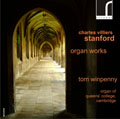 If
you had asked me what enterprising company had recently recorded
the original version of Mendelssohn’s Octet, vocal
works by Judith Bingham and the organ music of Stanford, I might
have guessed Chandos or Hyperion, had I not known the answer.
I don’t think anyone could have got off to a more varied
and adventurous start than the Resonus Classics label, the first
to take the leap into download-only territory and in as wide
a range of formats as the more established download sites –
wider, indeed, than most. And, though Chandos in particular,
Hyperion and Naxos have taken up the cause of Stanford’s
orchestral, chamber and vocal music, there was still a need
for a good recording to rescue the organ music from its place
as prelude or postlude to a church service: it fills that role
admirably, but it deserves to be heard in its own right. Now
that HRH the Prince of Wales is taking up the cudgels on behalf
of Parry (The Prince and the Composer, 27 May 2011, BBC4), it’s
time that Stanford, too, received his due (overdue) attention. If
you had asked me what enterprising company had recently recorded
the original version of Mendelssohn’s Octet, vocal
works by Judith Bingham and the organ music of Stanford, I might
have guessed Chandos or Hyperion, had I not known the answer.
I don’t think anyone could have got off to a more varied
and adventurous start than the Resonus Classics label, the first
to take the leap into download-only territory and in as wide
a range of formats as the more established download sites –
wider, indeed, than most. And, though Chandos in particular,
Hyperion and Naxos have taken up the cause of Stanford’s
orchestral, chamber and vocal music, there was still a need
for a good recording to rescue the organ music from its place
as prelude or postlude to a church service: it fills that role
admirably, but it deserves to be heard in its own right. Now
that HRH the Prince of Wales is taking up the cudgels on behalf
of Parry (The Prince and the Composer, 27 May 2011, BBC4), it’s
time that Stanford, too, received his due (overdue) attention.
The recordings were made on the organ of Queen’s College,
Cambridge, an 1892 Binns instrument still largely in the same
state as in its Victorian heyday, so ideal for the music. The
organist, Tom Winpenny, most recently featured very ably in
the Naxos recording of John Rutter’s Gloria (8.572653
– see review
and May 2011/1 Roundup).
Without much in the way of competition to use as a benchmark
– four of the works are receiving world premiere recordings
and I couldn’t lay hands on any of the scores in time –
this recording now leads the field. There are rival recording
of the Postlude, Op.105/6, on a Naxos recording of Stanford’s
Anthems and Services (8.555794 – see review)
and on OxRecs (OXCD41) and that’s about it.
There may not be much variety in Stanford’s organ music,
with most of it designed on a large scale, but Winpenny makes
the most of what variety there is. Of the new works Epithalamium
is for me the most attractive – why don’t we hear
it at weddings? – but there’s no dross here at all
unless the sound of a Victorian composer on a Victorian organ
really turns you off. At worst the music is workaday, but good,
well crafted workaday stuff.
The recording is more than acceptable in mp3 and first-rate
in 24/96 flac, the two formats which I was sent for review.
Overall, I found this a revealing and enjoyable issue. I look
forward to hearing more from Tom Winpenny, here making his solo
recording debut, and Resonus, who have now scored an impressive
three out of three with their initial releases.
Claude DEBUSSY (1862-1918)
Orchestral Works: 6
Suite bergamasque (1890-1905, orch. Gustave Cloez and
André Caplet) [16:57]
Petite Suite (1889, orch. Henri Büsser) [13:02]
Printemps (1887, orch. Henri Büsser, 1912) [15:18]
En blanc et noir (1915, orch. Robin Holloway, 2002) [17:32]
Symphony in b minor (1880, orch. Tony Finno) [11:15]
Orchestre National de Lyon/Jun Märkl – rec. January
and February 2010. DDD
Pdf booklet available with download.
NAXOS 8.572583 [74:21] – from classicsonline.com
(mp3) or stream from Naxos Music Library
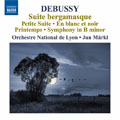 I
was not entirely impressed by Volume 5 in this series, which
I reviewed as a CD – here
and May 2011/2 Roundup
– though I was swimming against the flow of the critical
tide in thinking some of the tempi too slow and the resulting
performances a little dull. Here, too, I wondered if Märkl
were not milking the well-known Clair de lune, the third
movement of the Suite bergamasque a little too much until
I compared his 4:46 with several performances of the piano original
which milk the emotion yet more. Even Jean-Yves Bavouzet on
his award-winning Chandos series takes almost exactly the same
time as Märkl. Yet Yan Pascal Tortelier still seems to
me to have the right tempo and right degree of affection for
the piece – not too much – despite the marking très
expressif – at 4:19. (Chandos budget-price Introduction
to Debussy, CHAN2024
or on the 4-CD set, CHAN10144X, which I recommended in the May
2011/2 Roundup). I
was not entirely impressed by Volume 5 in this series, which
I reviewed as a CD – here
and May 2011/2 Roundup
– though I was swimming against the flow of the critical
tide in thinking some of the tempi too slow and the resulting
performances a little dull. Here, too, I wondered if Märkl
were not milking the well-known Clair de lune, the third
movement of the Suite bergamasque a little too much until
I compared his 4:46 with several performances of the piano original
which milk the emotion yet more. Even Jean-Yves Bavouzet on
his award-winning Chandos series takes almost exactly the same
time as Märkl. Yet Yan Pascal Tortelier still seems to
me to have the right tempo and right degree of affection for
the piece – not too much – despite the marking très
expressif – at 4:19. (Chandos budget-price Introduction
to Debussy, CHAN2024
or on the 4-CD set, CHAN10144X, which I recommended in the May
2011/2 Roundup).
For me Printemps is the highlight of the new Naxos recording
– a most unjustly neglected and magical work which I first
got to know from Charles Munch on an RCA recording. (Currently
Sony Originals 88697689542). Here again I chose Tortelier as
my benchmark among modern recordings and was surprised to find
myself preferring Märkl’s slightly faster tempo for
the opening très modéré section:
he keeps the music moving without ever pushing it too fast –
indeed, it’s dreamy at first as the tentative signs of
Spring appear. In the second section Märkl and Tortelier
choose almost exactly the same overall tempo – both capture
the exuberance without being over-exuberant. Though not quite
recapturing the remembered magic of that Munch performance,
this new recording makes a very acceptable substitute.
Debussy’s sole attempt at writing a symphony – not
an amenable musical form for him: he completed only the three
sections of the first movement – has survived only in piano-duet
score. The version which we hear on this recording has been
orchestrated by the American composer and arranger Tony Finno.
I haven’t heard the Naxos recording of the work in keyboard
form, coupled with Printemps and other things on 8.572385,
but there is everything to be said for attempting to reconstruct
the music in its original orchestral garb. It’s attractive,
generally light-hearted music – as is most of the music
on this CD – and the orchestration and performance make
a good case for it.
With very acceptable mp3 sound and the booklet as part of the
deal, this is a much more attractive proposition than its immediate
predecessor.
Richard STRAUSS (1864-1949)
Salome (1905)
Herod Antipas, Tetrarch of Judea – Reiner Goldberg (tenor)
Herodias, Herod’s wife – Anja Silja (soprano)
Salome, Herodias’s daughter – Inga Nielsen (soprano)
Jokanaan – Robert Hale (bass-baritone)
Narraboth – Deon van der Walt (tenor)
Danish National Symphony Orchestra/Michael Schønwandt
rec.18-23, 25-29 August 1997, Danish Radio Concert Hall, Copenhagen,
Denmark. DDD.
pdf booklet with texts and translations available.
CHANDOS CHAN 9611 [2 CDs: 98:58] from theclassicalshop.net
(mp3, lossless)
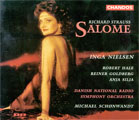 George
Bernard Shaw dubbed Puccini’s Tosca a ‘shabby
little shocker’, an epithet that surely applies to Strauss’s
Salome as well. And yet much of this music is richly
sensual, only tipping into frenzy and frisson at nodal
points in the drama. Sir Georg Solti’s classic Decca set
with Birgit Nilsson in the name part is more nervy and propulsive
than most, while at the other end of the spectrum is Karajan’s
sumptuous EMI version with Hildegard Behrens in the title role.
Both are compelling in their different ways, Karajan’s
more shocking because it’s so beautiful. And then there’s
Karl Böhm’s classic 1972 recording with Leonie Rysanek
as the wayward daughter; hers is a fine performance, although
there is some stage noise and the singers are set quite far
back. Admittedly that’s more as one would hear it in the
opera house, but it adds a degree of emotional distance as well. George
Bernard Shaw dubbed Puccini’s Tosca a ‘shabby
little shocker’, an epithet that surely applies to Strauss’s
Salome as well. And yet much of this music is richly
sensual, only tipping into frenzy and frisson at nodal
points in the drama. Sir Georg Solti’s classic Decca set
with Birgit Nilsson in the name part is more nervy and propulsive
than most, while at the other end of the spectrum is Karajan’s
sumptuous EMI version with Hildegard Behrens in the title role.
Both are compelling in their different ways, Karajan’s
more shocking because it’s so beautiful. And then there’s
Karl Böhm’s classic 1972 recording with Leonie Rysanek
as the wayward daughter; hers is a fine performance, although
there is some stage noise and the singers are set quite far
back. Admittedly that’s more as one would hear it in the
opera house, but it adds a degree of emotional distance as well.
Inexplicably, Michael Schønwandt’s Salome
– much-praised since its appearance in 1999 – has
evaded me until now. I was particularly keen to hear what Danish
soprano Inga Nielsen brings to this most challenging of roles,
and whether this Danish orchestra has the necessary amplitude
in Strauss’s more orgiastic moments. Scene I, with Narraboth
and Herodias’s Page, sets the stage for a warm, well-balanced
recording, the voices close without being unnaturally so. But
what one registers even at this early stage is the exemplary
playing of the Danish band. So, no quibbles about amplitude
here, Schønwandt moving the drama forward without overstretching
his singers. South African Deon van der Walt is a ringing, steady
Narraboth, the American Robert Hale a sonorous Jokanaan. A word
of warning, though; those used to the subterranean sound of
the Baptist singing in the cistern (Decca) may be disconcerted
to hear him so close.
Nielsen’s Salome is firm of tone, yet with just the right
degree of girlish pout as she demands to speak with the fiery
prophet. And just listen to the dark storm-clouds that gather
in the orchestra, the low brass rasping to thrilling effect.
As musical harbingers go, this is potent stuff, Thankfully Schønwandt
underlines the drama without overplaying his hand as it were.
As for this Salome, she modulates easily from spoilt brat to
manipulative coquette; Nielsen clearly understands this chameleon-like
character, and is utterly convincing in her swings of mood and
manner.
Schønwandt makes the most of Strauss’s musical narrative;
indeed, those harp swirls have seldom sounded so flirtatious,
the beckoning blackness so Stygian. Full marks to the Chandos
team for making this sometimes reticent ensemble sound so rich
and creamy, the balance between voices and orchestra well judged.
And goodness, how one’s flesh crawls as Salome and the
Baptist come face to face; it’s a corrosive mix of fascination
and foreboding, those skewed brass figures deeply unsettling.
Remarkably, Schønwandt and Strauss collude to create
a musical and dramatic vortex here, into which the protagonists
are irresistibly drawn. This is yet another of the opera’s
dark, downward lurches, so adroitly managed here. But it’s
Nielsen, riveted by the ‘wasted’ prisoner, who draws
the ear with her fearless, accurate singing. Surely this is
as thrilling, various and complex a Salome as we’re ever
likely to hear.
Nielsen doesn’t get it all her own way, for Hale steals
the limelight – albeit briefly – as he sings most
eloquently of Christ and his disciples on Galilee. True, he
may not be as overtly dramatic as some, but his Jokanaan, intelligently
sung, fits so well with Schønwandt’s more nuanced
view of this score. As for the orchestral convulsion that greets
Salome’s grotesque demand to kiss the Baptist and the portent-filled
music of Scene IV, they’re simply splendid, the sound blossoming
without strain in those dense tuttis. Reiner Goldberg is a predatory,
wheedling Herod, his fruited metaphors a thinly disguised reprise
of Salome’s illicit feelings for Jokanaan; Anja Silja,
not always the most ingratiating of singers, is adequate as
his long-suffering wife, even if she is prone to squall under
pressure. That said, the cast is pretty good, and that goes
for the assorted Jews and Nazarenes as well.
Any cavils thus far? Well, as good as Hale undoubtedly is I
did find his tone a tad unvarying in his remonstrations with
Herodias. A bit more fire and brimstone would not go amiss here,
but then this is a side-show, a precursor to the main event
dominated by Salome’s bargain with Herod and that famous
dance. The latter’s not as wild as it can be, perhaps –
some might even find it too laid back – but there’s
bags of orchestral detail and Schønwandt does build to
a decent climax. Once again, if you like this music played with
sheer abandon then Solti’s the man for you; but for a good
all-round performance this Chandos recording is hard to beat.
As for Nielsen, her deranged calls for the prophet’s head
chill one to the marrow. Curiously there’s more of a sense
of theatre in this studio production than there is in Böhm’s
staged one, but Karajan and Solti are very persuasive in other
ways. Perhaps the greatest strength of this Chandos set is that
Schønwandt makes the most of the score without recourse
to musical exaggeration or other excess; the result is a grimly
compelling narrative from first to last. At the centre of it
all is Nielsen’s Salome, increasingly unhinged as her end
draws near. The great finale, which burns with a slow, steady
heat, is phenomenal, a feat of vocal stamina and dexterity;
as for the orchestra, they too seem to draw on hitherto hidden
reserves of weight and power at this point.
If you want a downloadable Salome I suspect your options
may be limited [see below BW], but I’m tempted
to say that even if they weren’t this would still be the
one to have. With generally consistent singing, superlative
playing and a top-notch recording this should be in every Straussian’s
collection. As usual, Chandos offer pdf artwork and liner-notes
– including a trilingual libretto – the latter of
which can be followed on your computer screen if you’d
rather not waste your printer ink. One small moan though; I
had trouble downloading some of the tracks and only managed
a full set after two or three visits to the site.
Still, a must have for your hard drive.
Dan Morgan
[Like Dan, I had trouble downloading all the tracks – most
unusually for the Chandos site, only one third came down the
chute each time.
It’s becoming something of a habit to find myself in more
or less complete agreement with Dan’s reviews, to the extent
of recommending this overall but with very small reservations
– the Dance really is a bit too tame. As for the
alternatives, Passionato can supply Solti for £12.99 in
mp3 only – Decca 414 4412 here
or Decca Originals 475 7528 here
– and Amazon.co.uk has the latest incarnation of the Karajan
on EMI Classics 9668322, again in mp3 only, for £7.49
here.
The Karajan download includes a pdf booklet. (But NB: MDT have
the Karajan CD set, plus a bonus CD-ROM, currently on offer
as I write for just a few pence more than the download.) Amazon
also have the Böhm set for download at £11.99 here.
BW]
Florent SCHMITT (1870-1958)
La Tragédie de Salomé, Op.50 (complete
ballet, 1907) [59:07]
Marie-Paule Fayte (soprano); Rhineland Palatinate State Symphony
Orchestra/Patrick Davin
NAXOS 8.550895 [59:07] – from classicsonline.com
(mp3) or stream from Naxos Music Library.
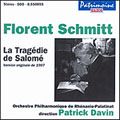 This
is the original small-orchestral ballet score for the Ballets
Russes from which Schmitt later excerpted the better-known Suite
(below) and the version for piano (Naxos 8.572194). It followed
hard on the heels of Richard Strauss’s opera (above). The
debt to that work and to Stravinsky’s The Firebird
is very apparent – more so than in the Suite. It’s
all well worth hearing in this, the only recording to the best
of my knowledge. The performance does justice to the music and
the recording (ex-Marco Polo) sounds well in mp3. This
is the original small-orchestral ballet score for the Ballets
Russes from which Schmitt later excerpted the better-known Suite
(below) and the version for piano (Naxos 8.572194). It followed
hard on the heels of Richard Strauss’s opera (above). The
debt to that work and to Stravinsky’s The Firebird
is very apparent – more so than in the Suite. It’s
all well worth hearing in this, the only recording to the best
of my knowledge. The performance does justice to the music and
the recording (ex-Marco Polo) sounds well in mp3.
I must admit to liking Salomé in either version
a good deal more than Psalm 47, which I find somewhat
brash, so there are definite attractions for me in the Naxos
recording of the complete score or the new Atma version coupled
with the Franck Symphony (below).
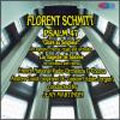 Psalm
47, Op. 38* [27:21] Psalm
47, Op. 38* [27:21]
La Tragédie de Salomé, Op. 50 [27:18]
*Andrea Guiot (soprano)
French National Radio Orchestra & Chorus/Jean Martinon –
rec. 1972.
Sung texts and translations provided
HIGH DEFINITION TAPE TRANSFERS [54:39] from HDTT
(HQCD, DVD & 24bit/96kHz or 24bit/192kHz download). Originally
released as EMI ASD 2892
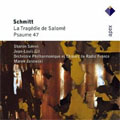 La
Tragédie de Salome for orchestra with chorus, Op.50
(1907, rev.1910) [26:23] La
Tragédie de Salome for orchestra with chorus, Op.50
(1907, rev.1910) [26:23]
Psalm 47 for soprano, chorus, organ and orchestra, Op.38 [26:16]
Sharon Sweet (soprano)
Orchestre Philharmonique et Chœurs de Radio France/Marek
Janowski – rec. 1988, 1989. DDD
WARNER APEX 2564 62764-2 [52:39] – from amazon.co.uk
(mp3)
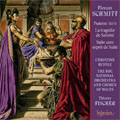 Psaume
XLVII, Op.38 [30:19] Psaume
XLVII, Op.38 [30:19]
Suite sans esprit de suite, Op.89 [17:49]
La tragédie de Salomé, Op.50 [30:09]
Christine Buffle (soprano)
BBC National Orchestra and Chorus of Wales/Thierry Fischer –
rec. October 2006. DDD
Pdf booklet with texts and translations included.
HYPERION CDA67599 [78:19] – from hyperion-records.co.uk
(mp3 and lossless)
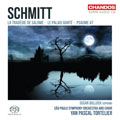 La
Tragédie de Salome for orchestra with chorus, Op.50
(1907, rev.1910)* [25:29] La
Tragédie de Salome for orchestra with chorus, Op.50
(1907, rev.1910)* [25:29]
Le Palais hanté, Op.49 [13:36]
Psalm 47 for soprano, chorus, organ and orchestra, Op.38 **
[28:44]
*Natália Áurea; Regiane Martinez (soprano); Cely
Kozuki; Cristiane Minczuk; Fabiana Portas; Maria Angélica
Leutwiler; Mônica Weber Bronzati; Vesna Bankovic (mezzo);
** Susan Bullock (soprano); Sao Paolo Symphony Orchestra Choir;
Sao Paolo Symphony Orchestra/Yan Pascal Tortelier – rec
5-9 July, 2010. DDD/DSD.
Pdf booklet with texts and translations available.
CHANDOS CHAN5090 [68:10] – from theclassicalshop.net
(mp3, lossless, 24/96 and surround sound)
Also available as Hybrid SACD CHSA5090 from chandos.net
In all four cases, Psalm 47 failed to impress me as more
than noisily exuberant (though see also Rob Barnett’s review).
In the case of the HDTT Martinon, that’s partly because
early-1970s technology doesn’t seem to have been equal
to the task: though Salomé sounds well as a performance
and recording, the Psalm seems irremediable. HDTT’s
24/96 downloads usually play perfectly well through Squeezebox,
but the Schmitt seemed to be too rich for its liking and kept
causing dropouts. Winamp, however, rode to the rescue and played
the whole thing securely: if you don’t have Winamp, the
free version is easy to download and is well worth having.
The Warner Apex version is the least expensive way to obtain
Salomé and Psalm 47, though the shortish
playing time reduces the value. Rob Barnett recommended this
recording in an earlier 2-CD incarnation: ‘a well-conceived
and enthusiastic performance’ of Salomé and a ‘blazingly
done’ account of the Psalm – see review.
Of the Apex reissue, he wrote: ‘If you are up for impressionist-romantic
music of luxurious opulence this is for you.’ – see
review.
That’s equally true for the download, and you can even
have the two tracks of Salomé separately if you
prefer, for just £2.58. overall, in terms of value for
money and as a performance, this would be my recommendation
for those wanting the Salomé – Psalm 47 combination
or just Salomé alone.
In its own way, the Hyperion is also a bargain, since it offers
an extra 18 minutes in the form of the Suite that isn’t
a suite. Though Fischer’s timing for Salomé
appears to be out on a limb – four minutes longer than
Janowski, with only Nézet-Séguin on the new Atma
release (below) coming close – the result is actually as
lively and persuasive as any of the rivals. John Quinn wrote
a detailed and enthusiastic review of the CD and I can’t
do better than refer you to that – here.
As he writes, Fischer and the NOW capture the Dionysiac spirit
of the music excellently and the recording – in lossless
form, at any rate* – does them full justice. The snag,
again, is that none of the recordings which I’m considering,
Fischer included, makes Psalm 47 seem anything other
than brash – it’s just not for me, which is why I
recommend that you download just the two tracks of Salomé
from the Apex recording. Or, indeed, do the same with the Hyperion
where individual works can be purchased separately – Salomé
alone costs £3.80 and the Suite £2.25.
* When, occasionally, I have sampled the mp3 of any Hyperion
recording – as with the Gottschalk (above) – I’ve
been more than happy with the results.
Florent SCHMITT La Tragédie
de Salomé, Op.50 [29:11]
César FRANCK (1822-1890)
Symphony in D, M48 [41:33]
Montreal Metropolitan Orchestra/Yannick Nézet-Séguin
ATMA CLASSIQUE ACD22647 [70:44] – from classicsonline.com
(mp3) or stream from Naxos Music Library
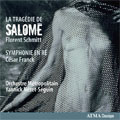 Just
the Suite (here referred to as a Symphonic Poem) generously
coupled with the Franck Symphony, conducted by the up-and-coming
Yannick Nézet-Séguin, recently appointed to head
the Philadelphia Orchestra. The performance is idiomatic and
the Franck coupling – also well performed – may make
a more attractive companion for some listeners than Psalm
47 on the rival versions. The mp3 sound is good, even heard
in the more restricted version on Naxos Music Library: just
don’t believe the statement there that the Franck Symphony
is in d minor. Just
the Suite (here referred to as a Symphonic Poem) generously
coupled with the Franck Symphony, conducted by the up-and-coming
Yannick Nézet-Séguin, recently appointed to head
the Philadelphia Orchestra. The performance is idiomatic and
the Franck coupling – also well performed – may make
a more attractive companion for some listeners than Psalm
47 on the rival versions. The mp3 sound is good, even heard
in the more restricted version on Naxos Music Library: just
don’t believe the statement there that the Franck Symphony
is in d minor.
Dan Morgan has also compared some of the versions of
Schmitt’s music:
It’s good to see the São Paulo orchestra recording
for Chandos; this follows a good run with BIS that yielded,
among others, an electric performance of Tchaikovsky First Piano
Concerto with Yevgeny Sudbin and Heitor Villa-Lobos’ Floresta
do Amazonas, the latter well received in the March
Roundup. Both were conducted by John Neschling, who was
succeeded by Yan Pascal Tortelier in 2009; the good news is
that Marin Alsop, who has done such a splendid job in Bournemouth
and Baltimore, will take the helm in 2012. I expect great things
from that partnership, and I hope many recordings will follow.
Profligacy rules in Florent Schmitt’s sprawling Psalm
47 and the truncated Salome, based on a ballet he
was commissioned to write in 1907. Both works are ambitiously
scored, the Psalm for large orchestra, chorus, soprano and organ.
I know these pieces from Marek Janowski’s 1990 recording,
first issued on Erato but now available from Warner Apex. Here
I’ll focus on two high-res downloads, one from Chandos
and one from HDTT. The latter, taken from a 1972 EMI disc conducted
by Jean Martinon, includes a warmly sensuous reading of the
abridged Salome. Compared with the hyperactive, attention-seeking
Psaume 47 it’s a low-key piece that only betrays
its analogue LP origins in the infrequent tuttis.
It’s certainly a pleasing performance – the sections
aren’t individually cued as they are on the Chandos version
– but I did find myself returning to Janowski’s equally
persuasive recording, which is much better recorded. Not surprisingly,
Tortelier and his Brazilian band have the most spectacular sound.
From the louring bass and soft gong-strokes at the outset it’s
clear this is going to be a highly atmospheric performance;
it’s also very sensual, Tortelier shaping the Debussian
introduction very well indeed. In terms of colour and nuance
this reading is streets ahead of Martinon’s, and augurs
well for what’s still to come. Climaxes expand naturally
with plenty of transient attack.
If anything, Tortelier makes this Salome seem more interesting
than it actually is, thanks in part to his forensic attention
to detail. That said, he never loses sight of the larger canvas;
as for the orchestra, they play with real spirit, especially
in the score’s more animated passages. There’s some
lovely woodwind playing as well, the whole performance blending
polish with passion. I wasn’t very impressed with this
reading at first, but I did warm to it on subsequent auditions;
for sheer drama it’s the one to have, with Janowski and
Martinon less exciting in those dramatic peaks. Also, the ethereal
voices in the third section are cleanly focused and well-balanced
on the Chandos, making it the most convincing concert-hall experience.
The same holds for Tortelier’s version of Psaume 47,
the Brazilian chorus as transported as one could wish. Percussive
detail is superb, and even the rather subdued organ doesn’t
undermine Schmitt’s towering structures. That said, momentum
does flag at times, but that’s nothing compared with the
almost constant distortion on the Martinon version. I found
it unlistenable, even at modest volume levels, so despite a
decent Salome this HDTT download just isn’t competitive.
Would that the reviewer’s task were always so cut and dried;
just as I was preparing to anoint Tortelier and his forces Susan
Bullock’s horribly wide vibrato forced me to reconsider.
True, it’s a punishing solo, more so when pitted against
such a mighty noise, but under pressure the close balance simply
highlights that distressing beat. To be fair, Martinon’s
Andrea Guiot – set much further back – isn’t
very distinguished either. Janowski’s soprano, Sharon Sweet,
is steadier and more eloquent, but then Janowski’s is a
very balanced performance all round. As for the organ, the Erato/Warner
one sounds like a real-world instrument in a proper acoustic;
EMI’s, played by the esteemed Gaston Litaize, just sounds
bizarre.
These reservations aside, I’m not convinced Tortelier has
the measure of this unwieldy work; Janowski is less visceral,
but then he does dig deeper than his rivals, especially in the
Psalm. He and Tortelier offer other works as well; the
latter’s reading of a Schmitt rarity, Le Palais hanté,
is mildly diverting but nothing more. As before, the playing
and recording are good.
I imagine the Chandos performances will be a hit with head bangers,
but if you’re looking for a more fulfilling – and
considerably cheaper – option then the Janowski is a good
buy.
Dan Morgan
Kenneth LEIGHTON (1929-1988)
Et Resurrexit, Op. 49 [17:23]
Six Fantasies on Hymn Tunes, Op. 72 [12:25]
Missa de Gloria, Op. 82, ‘Dublin Festival Mass’
[40:12]
Greg Morris (Organ of Blackburn Cathedral)
(J. W. Walker & Sons, 1969, rebuilt by Wood of Huddersfield,
2002)
rec. Blackburn Cathedral, England, 26-27 April 2009. DDD
NAXOS 8.572601 [70:10] – from classicsonline.com
(mp3)
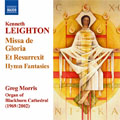 The
organ that I knew in my home town of Blackburn has been replaced
and the replacement rebuilt since I moved away. I don’t
know what my old music teacher, who was the cathedral organist,
would say about how it now sounds – or, indeed, about the
music of Kenneth Leighton, which wasn’t on the curriculum
back then. For me it produces just the right sound for Leighton’s
organ music. I knew that it’s a fine instrument for Alkan’s
organ music, from a Toccata recording by Kevin Bowyer which
I reviewed in the November 2009 Roundup, and I imagine that
that it would sound equally well for Messiaen. Indeed, I hear
more than a touch of the influence of the French organ school
in Leighton’s music, though it’s far from imitative.
This new recording joins Naxos’s equally recommendable
disc of Leighton’s choral music, An Easter Sequence
(8.555795 – see review,
also available from classicsonline.com). The
organ that I knew in my home town of Blackburn has been replaced
and the replacement rebuilt since I moved away. I don’t
know what my old music teacher, who was the cathedral organist,
would say about how it now sounds – or, indeed, about the
music of Kenneth Leighton, which wasn’t on the curriculum
back then. For me it produces just the right sound for Leighton’s
organ music. I knew that it’s a fine instrument for Alkan’s
organ music, from a Toccata recording by Kevin Bowyer which
I reviewed in the November 2009 Roundup, and I imagine that
that it would sound equally well for Messiaen. Indeed, I hear
more than a touch of the influence of the French organ school
in Leighton’s music, though it’s far from imitative.
This new recording joins Naxos’s equally recommendable
disc of Leighton’s choral music, An Easter Sequence
(8.555795 – see review,
also available from classicsonline.com).
John McCABE (b.1939) Edward
II – ballet in 2 acts (1993-4)
Royal Ballet Sinfonia/Barry Wordsworth – rec. November
1999. DDD.
HYPERION CDA67135/6 [58:12 + 55:37] – from hyperion-records.co.uk
(mp3 and lossless)
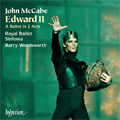 This
could easily have been my Discovery of the Month, had Hyperion
not excelled themselves with the Schöndorff recording.
I hadn’t encountered this ballet before – indeed,
John McCabe’s music in general has not been frequent listening
for me, apart from the odd concert on Radio 3. I came across
Edward II among Hyperion’s waifs and strays, consigned
to their half-price ‘please buy me’ section owing
to the indifference of those like me who haven’t yet discovered
McCabe. I should have read Gerald Fenech’s 5-star review. This
could easily have been my Discovery of the Month, had Hyperion
not excelled themselves with the Schöndorff recording.
I hadn’t encountered this ballet before – indeed,
John McCabe’s music in general has not been frequent listening
for me, apart from the odd concert on Radio 3. I came across
Edward II among Hyperion’s waifs and strays, consigned
to their half-price ‘please buy me’ section owing
to the indifference of those like me who haven’t yet discovered
McCabe. I should have read Gerald Fenech’s 5-star review.
The offer will have ended before you read this, but the download,
at £13.49, costs little more. I strongly recommend purchasing
the lossless (flac) version: it’s the same price as the
mp3 and flac usually guarantees flawless joins between tracks
where the music is continuous, which mp3 doesn’t always
manage to do.
The ballet is based on the life of King Edward II, best known
from Marlowe’s play of that name and the music is eclectic
enough for there to be something for everybody here. There’s
even an attempt to capture the spirit of medieval music –
though not as successfully as I had hoped – in the funerals
for Edward I at the beginning and Edward II at the end. The
booklet is not quite up to Hyperion’s usual standard –
it appears to be a work in progress, with a temporary scanned
version of the CD documentation – but it’s more than
adequate. If you play the music via Squeezebox or a similar
programme, the track details include a summary of the action.
In Lighter Mood
When I recommended various recordings of music by Michael Prætorius
in the December 2009 Roundup, I inadvertently omitted the least
expensive, at around £5 on CD or as a download from classicsonline.com
for £4.99:
Michael PRÆTORIUS (1571-1621)
Dances from Terpsichore (1612)
Thoinot ARBEAU (1519-1595) from
Orchesographie (1589)
Dances from the School of Gregorio
LAMBRANZI (c.1640)
Anthony HOLBORNE (c.1560-1602)
Short Airs, Both Grave and Light (1599)
Christoph DEMANTIUS (1567-1643)
German and Polish Dances (1601)
The Prætorius Consort/Christopher Ball – rec. c.1978?
MUSICAL CONCEPTS ALTO ALC1076 [74:50] – CD or download
from classicsonline.com
(mp3)
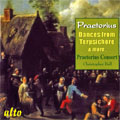 I
need say only that this foot-tapping collection is as enjoyable
as any of the more expensive versions, though I maintain my
overall allegiance to the David Munrow recording which introduced
us all to the music of Prætorius. The download comes without
the booklet which is worth having if, as I believe, this is
a straight reissue of a former Regis CD in my collection. Those
notes, however, fail to mention that the name ‘Thoinot
Arbeau’ is an anagram of Jehan Tabourot, who, as a cleric,
presumably didn’t wish to be recognised as the composer
of frivolous music. Nor do they mention that the name ‘Prætorius’
is a Latin disguise for the plain German name Schultze or Schultheiss:
it was very fashionable to have a Latin- Italian- or even Greek-sounding
name. I
need say only that this foot-tapping collection is as enjoyable
as any of the more expensive versions, though I maintain my
overall allegiance to the David Munrow recording which introduced
us all to the music of Prætorius. The download comes without
the booklet which is worth having if, as I believe, this is
a straight reissue of a former Regis CD in my collection. Those
notes, however, fail to mention that the name ‘Thoinot
Arbeau’ is an anagram of Jehan Tabourot, who, as a cleric,
presumably didn’t wish to be recognised as the composer
of frivolous music. Nor do they mention that the name ‘Prætorius’
is a Latin disguise for the plain German name Schultze or Schultheiss:
it was very fashionable to have a Latin- Italian- or even Greek-sounding
name.
|
|




 All Nimbus reviews
All Nimbus reviews








